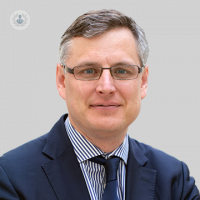COVID-19: advice for chemotherapy and immunotherapy patients
Written by:Cancer patients undergoing chemotherapy or immunotherapy during the COVID-19 pandemic may be at higher risk of complications from COVID-19 due to their cancer treatment. The UK government has issued specific advice for patients with cancer and COVID-19 which are regularly updated and should be followed by patients and their medical specialist. Here, medical oncologist Dr Mark Tuthill explains more.

Why are chemotherapy and immunotherapy patients more vulnerable to COVID-19?
Chemotherapy treatments can lower the number of immune cells that are available to fight bacterial and viral infections. The lowering of immune cell counts may make patients who receive chemotherapy for early and advanced cancers with a reduced ability to fight off infections like COVID-19. Once the treatment has completed, your immune counts will recover along with the ability to fight off infections.
For patients on immunotherapy, their immune system is activated and they may potentially develop a stronger immune response against the virus, which may them at higher risk of complications from infection with COVID-19.
If you are worried about your risk you should talk about it with your cancer specialist who will be able to inform you of your individual risk of complication from COVID-19.
What precautions should these patients take?
The most important thing for patients to do is follow the current UK government advice with regards to social distancing and shielding for extremely vulnerable patients, which can be found here.
You should discuss the precautions and your risk of infection of COVID-19 with your medical team. They will be able to determine any changes or extra precautions that need to be made to your treatment or social arrangements.
Have most chemotherapy treatments stopped?
Although some treatments were paused during the peak of the coronavirus pandemic, most cancer centres in the UK are now going back to offering patients the same or similar treatments for cancer as before the pandemic.
Most doctors in the UK have continued offering treatments that are essential to maintain cancer patient’s health and welling during the pandemic.
What alternative treatments might I be offered?
Alternative treatments to chemotherapy are often available and you should discuss these options with your medical team as to determine whether or not they are best for you.
What should I do if I show symptoms of COVID-19?
Please ring NHS 111 for advice and follow advice from the UK government website.
Can you summarise the situation for cancer patients and COVID-19?
Although patients with cancer that are on chemotherapy and immunotherapy treatments are at higher risk of complication of COVID-19, most patients with cancer or that have had cancer are now able to have usual cancer treatments, provided they and their medical teams follow government advice.
If you have any concerns about your cancer journey, particularly in relation to COVID-19, you should discuss this with your consultant.
If you would like Dr Tuthill to manage your cancer journey, you can book an appointment to see him via his Top Doctor’s profile here.


